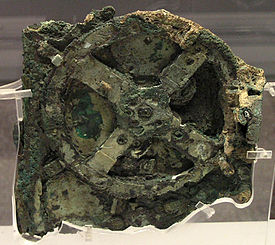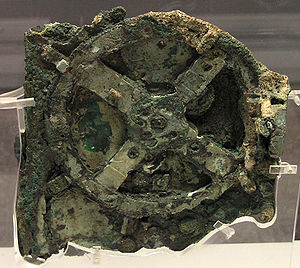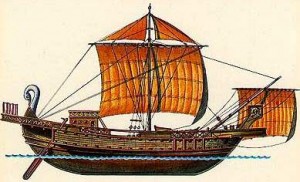For six years I’ve used this blog to aid beginning writers, but starting today I’ll occasionally take on other topics. Technology is fascinating to me, and today’s topic is those near misses in history when someone developed a technology before the world was ready.
What do I mean by ‘near misses?’ I’m talking about when an inventor came up with a new idea but it didn’t catch on, either because no one saw the possible applications or because there was no current need.
When you compare the date of the invention to the much later date when the idea finally took off, it’s intriguing to imagine how history might have been different, and how much further ahead we’d be today.
You’ll get a better idea of what I mean as we go through several examples.
Computers
The Antikythera Mechanism was likely the first computer, used for calculating the positions of  celestial bodies. Invented in Greece in the 2nd Century BC, it contained over 30 intricate gears, and may have been a one-off. It is interesting to speculate how history might have been different if they’d envisioned other uses for this technology, such as mathematical calculations. Imagine Charles Babbage’s geared computer being invented two millennia earlier!
celestial bodies. Invented in Greece in the 2nd Century BC, it contained over 30 intricate gears, and may have been a one-off. It is interesting to speculate how history might have been different if they’d envisioned other uses for this technology, such as mathematical calculations. Imagine Charles Babbage’s geared computer being invented two millennia earlier!
I was fascinated by the Antikythera Mechanism and the mystery surrounding its discovery in a shipwreck, so I wrote my story, “Wheels of Heaven,” with my version of those events.
Lasers
 It’s puzzling to me that inventors came up with radios (1896) before lasers (1960). After all, radio involves invisible electromagnetic waves, but lasers are visible light. Sure, the mathematics behind lasers (stimulated emissions) wasn’t around until Einstein, but with people monkeying around with mirrors and prisms, it’s strange that no one happened upon the laser phenomenon ahead of its mathematical underpinning.
It’s puzzling to me that inventors came up with radios (1896) before lasers (1960). After all, radio involves invisible electromagnetic waves, but lasers are visible light. Sure, the mathematics behind lasers (stimulated emissions) wasn’t around until Einstein, but with people monkeying around with mirrors and prisms, it’s strange that no one happened upon the laser phenomenon ahead of its mathematical underpinning.
Charles Fabry and Alfred Perot came close in1899 when they developed their Fabry-Perot etalon, or interferometer. Again, imagine how history might have been different if lasers had appeared sixty years earlier, before radio.
My story “Within Victorian Mists” is a steampunk romance featuring the development of lasers and holograms in the 19th Century.
Manned Rocketry
The first manned rocket flight may have been that of German test pilot Lothar Sieber on M arch 1, 1945. It was unsuccessful and resulted in Sieber’s death. The first successful manned flight was that of Yuri Gagarin of the Soviet Union on April 12, 1961.
arch 1, 1945. It was unsuccessful and resulted in Sieber’s death. The first successful manned flight was that of Yuri Gagarin of the Soviet Union on April 12, 1961.
But did Sieber and Gagarin have a predecessor, beating them by three centuries?
There is an account of a manned rocked flight in 1633, the trip made successfully in Istanbul by Lagâri Hasan Çelebi. It’s fun to imagine if the sultan of that time had recognized the possibilities. My story “To Be First” is an alternate history tale showing where the Ottoman Empire might have gotten to by the year 1933 if they’d capitalized on Çelebi’s achievement.
Submarines
The earliest attempts at underwater travel come to us in legends and myths. Highly dubious  accounts tell of
accounts tell of  Alexander the Great making a descent in a diving bell apparatus in 332 BC. There are vague references to the invention of a submarine in China around 200 BC. True submarine development really got its start in the 1500s, 1600s, and 1700s.
Alexander the Great making a descent in a diving bell apparatus in 332 BC. There are vague references to the invention of a submarine in China around 200 BC. True submarine development really got its start in the 1500s, 1600s, and 1700s.
Still, think about how much more we’d know today about the oceans if the ancient accounts were true and people of the time had make the most of them. My story “Alexander’s Odyssey” is a re-telling of the Alexander the Great episode, and “The Sea-Wagon of Yantai” is my version of the ancient Chinese submarine.
Steam Engines
In 1712, Thomas Newcomen developed the first commercially successful steam engine. Later, James Watt and Richard Trevithick improved on Newcomen’s design.
Later, James Watt and Richard Trevithick improved on Newcomen’s design.
However, these inventions were preceded by Hero (or Heron) of Alexandria in the 1st Century AD. He developed a small steam engine called an aeolipile, though he considered it an amusing toy.
What if Heron had visualized the practical possibilities of this engine? Since the steam engine ushered in the Industrial Revolution, could humanity have skipped ahead 1700 years technologically? My story, “The Wind-Sphere Ship,” imagines a practical use for Heron’s engine along with a reason it didn’t catch on.
Other Near Misses?
You get the idea. I am intrigued by the number of times inventors hit on an idea, but society failed to recognize it and take advantage of it, so it had to wait until much later. Are there other examples you can think of? Leave a comment for me. Your thoughts might well be featured in a post by—
Poseidon’s Scribe




















 When research revealed the wreck to be a Roman merchant ship, I checked out what those ships were like. They differ from trireme warships in interesting ways. The carved neck and head of a swan which I describe in the story was actually a common feature of these ships.
When research revealed the wreck to be a Roman merchant ship, I checked out what those ships were like. They differ from trireme warships in interesting ways. The carved neck and head of a swan which I describe in the story was actually a common feature of these ships.